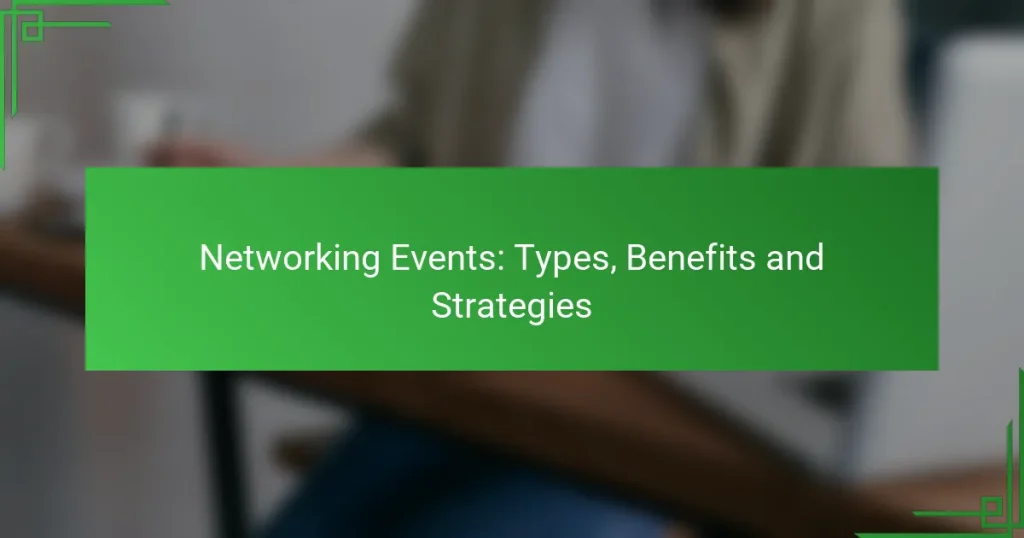Networking events are essential platforms for professionals to connect, share insights, and explore opportunities. By understanding the various types of events available, you can strategically select those that align with your career goals and maximize your networking potential.
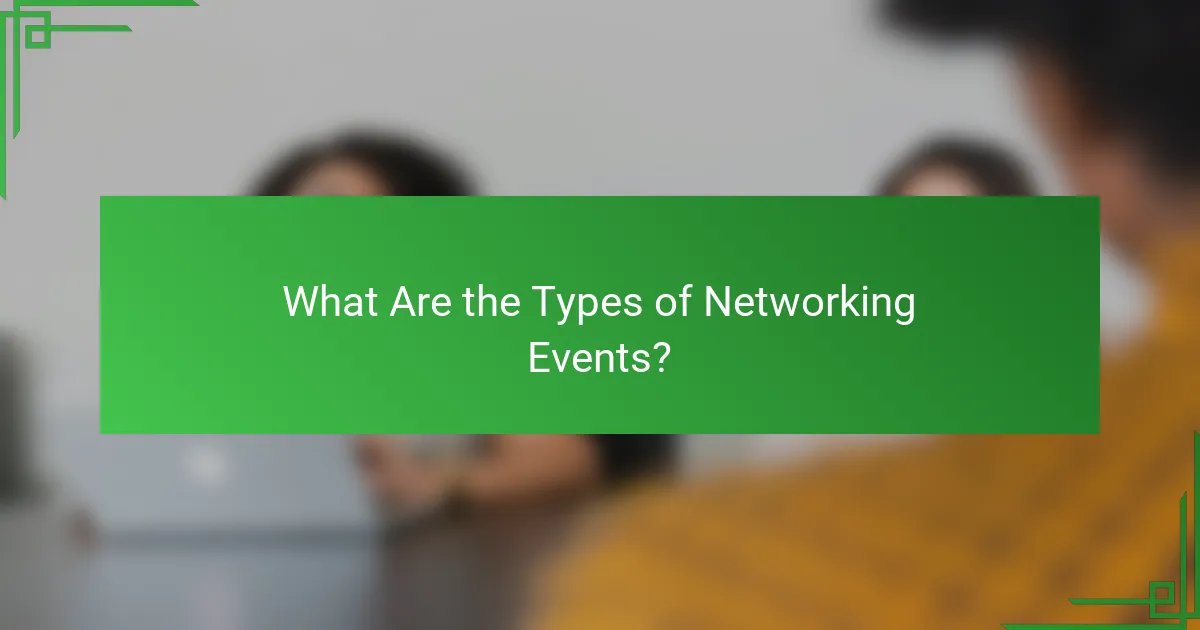
What Are the Types of Networking Events?
Networking events come in various formats, each designed to facilitate connections among professionals. Understanding the different types can help you choose the best opportunities for your goals.
Conferences
Conferences are large gatherings focused on specific industries or topics, often featuring keynote speakers, panel discussions, and breakout sessions. They provide an excellent platform for networking with peers, industry leaders, and potential clients.
When attending a conference, consider preparing an elevator pitch and researching attendees in advance. This will help you engage in meaningful conversations and make valuable connections.
Workshops
Workshops are interactive sessions that focus on skill development and practical learning. They often involve hands-on activities and smaller groups, making them ideal for networking in a more intimate setting.
To maximize networking at workshops, actively participate and ask questions. This not only enhances your learning experience but also allows you to connect with like-minded individuals.
Meetups
Meetups are informal gatherings that can vary in size and focus, often organized around shared interests or professional goals. They provide a relaxed atmosphere for networking and building relationships.
Joining local meetups can be an effective way to expand your network. Look for groups that align with your industry or interests, and attend regularly to foster connections.
Trade Shows
Trade shows are exhibitions where companies showcase their products and services to potential buyers and partners. They offer a unique opportunity to network with industry professionals and gain insights into market trends.
To make the most of trade shows, plan your visit by identifying key exhibitors and sessions to attend. Bring plenty of business cards and be prepared to discuss your offerings with potential collaborators.
Webinars
Webinars are online seminars that allow participants to engage in discussions and presentations from the comfort of their homes or offices. They have become increasingly popular for networking, especially in remote settings.
During webinars, utilize chat features to ask questions and connect with other attendees. Follow up with participants afterward to solidify connections and explore potential collaborations.
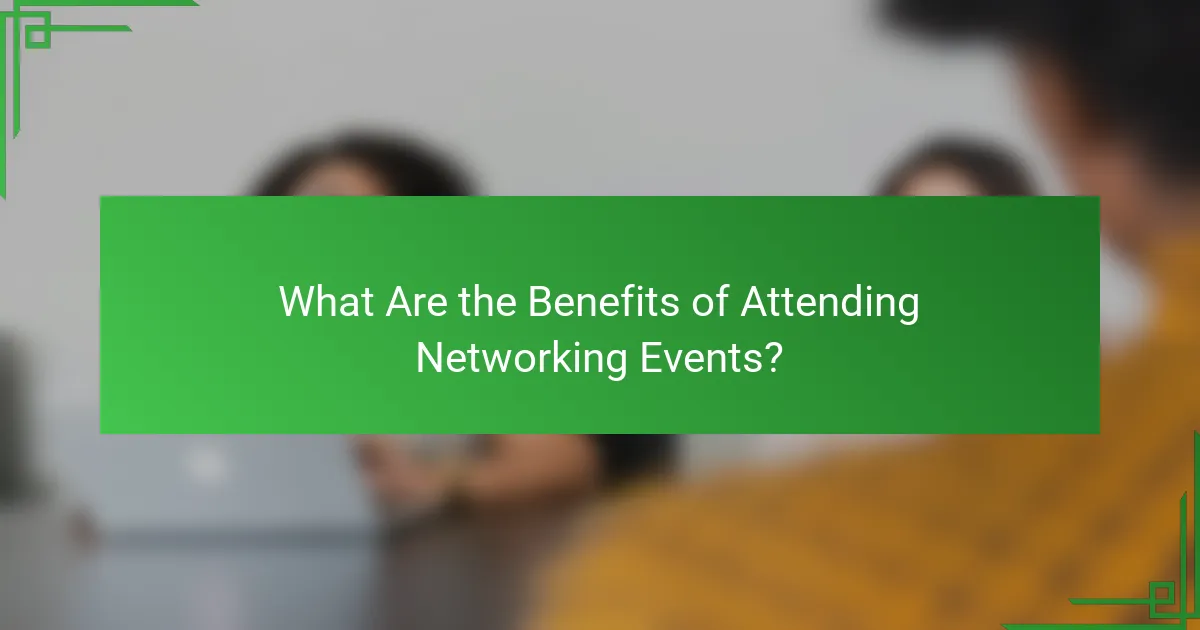
What Are the Benefits of Attending Networking Events?
Attending networking events offers numerous advantages, including the opportunity to connect with industry professionals, gain valuable insights, and enhance career prospects. These events foster relationships that can lead to collaborations, mentorships, and job opportunities.
Building Professional Relationships
Networking events are ideal for establishing and nurturing professional relationships. Meeting face-to-face allows for more genuine connections compared to online interactions. Engaging in conversations can lead to lasting partnerships and collaborations that benefit both parties.
To maximize relationship-building, approach conversations with a genuine interest in others. Ask open-ended questions and actively listen to their responses. Follow up after the event with a personalized message to reinforce the connection.
Accessing Industry Insights
Networking events provide access to valuable industry insights that can inform your career decisions. Attendees often share trends, challenges, and best practices that can enhance your understanding of the market. This knowledge can be crucial for staying competitive in your field.
Consider attending panels or workshops during these events to gain deeper insights. Engaging with speakers and asking questions can also provide clarity on complex topics, helping you stay informed about industry developments.
Enhancing Career Opportunities
Networking can significantly enhance your career opportunities by opening doors to job offers, promotions, or collaborations. Many positions are filled through referrals rather than traditional job postings, making connections vital for career advancement.
To leverage networking for career growth, clearly communicate your professional goals and interests. Be prepared with an elevator pitch that succinctly describes your skills and aspirations, making it easier for others to refer you to relevant opportunities.
Developing Skills
Attending networking events can also facilitate skill development. Many events include workshops or seminars that focus on specific skills relevant to your industry, such as leadership, negotiation, or technical expertise. Participating in these sessions can enhance your capabilities and make you more marketable.
Additionally, engaging with peers allows for the exchange of knowledge and experiences, which can provide practical insights into skill application. Take advantage of these opportunities by actively participating and seeking feedback from others.
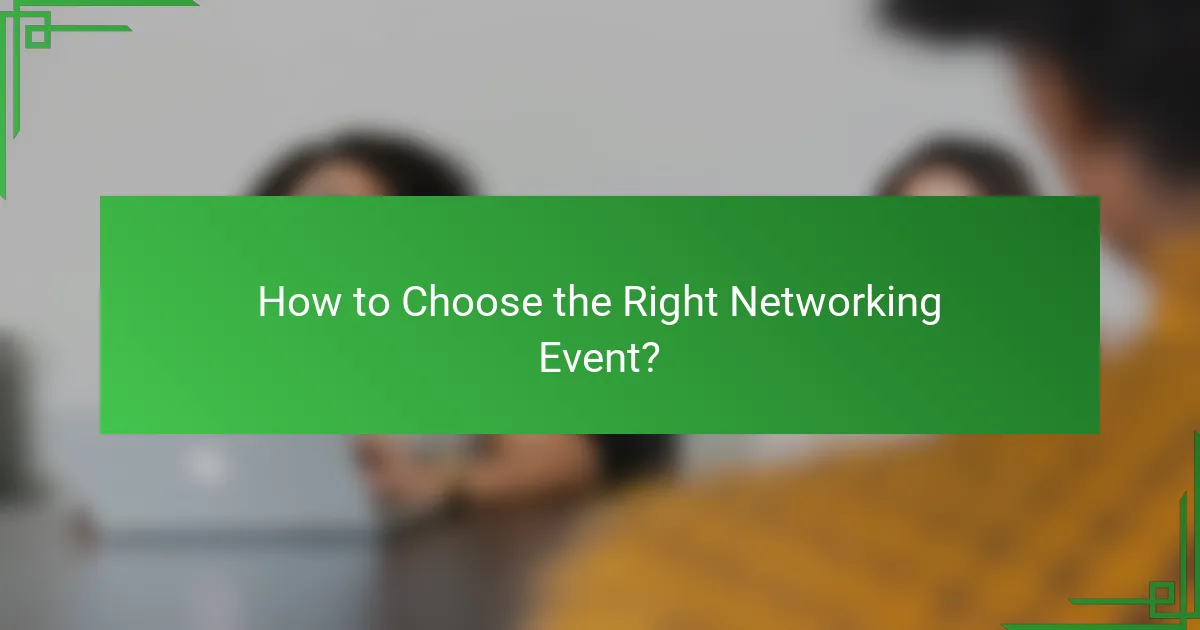
How to Choose the Right Networking Event?
Choosing the right networking event involves aligning your professional objectives with the event’s characteristics. Consider what you hope to achieve, who will be attending, and the format of the event to ensure it meets your needs.
Identify Your Goals
Start by defining your networking goals. Are you looking to expand your professional contacts, find potential clients, or seek mentorship? Knowing your objectives will help you select events that align with your aspirations.
For example, if your goal is to find new clients, look for industry-specific conferences or trade shows. If you’re seeking mentorship, consider smaller, more intimate gatherings where you can connect with experienced professionals.
Consider the Audience
The audience at a networking event can significantly influence its value. Research who typically attends the events you are considering. Are they industry leaders, peers, or potential collaborators?
Attending events with a relevant audience can enhance your chances of making meaningful connections. For instance, if you’re in tech, seek out events frequented by other tech professionals or companies looking for partnerships.
Evaluate the Format
The format of a networking event can affect how effectively you can engage with others. Consider whether the event is structured, like a panel discussion, or informal, like a meet-and-greet. Each format offers different opportunities for interaction.
For example, structured events may provide valuable insights but less personal interaction, while informal settings can foster deeper connections. Choose a format that suits your comfort level and networking style.
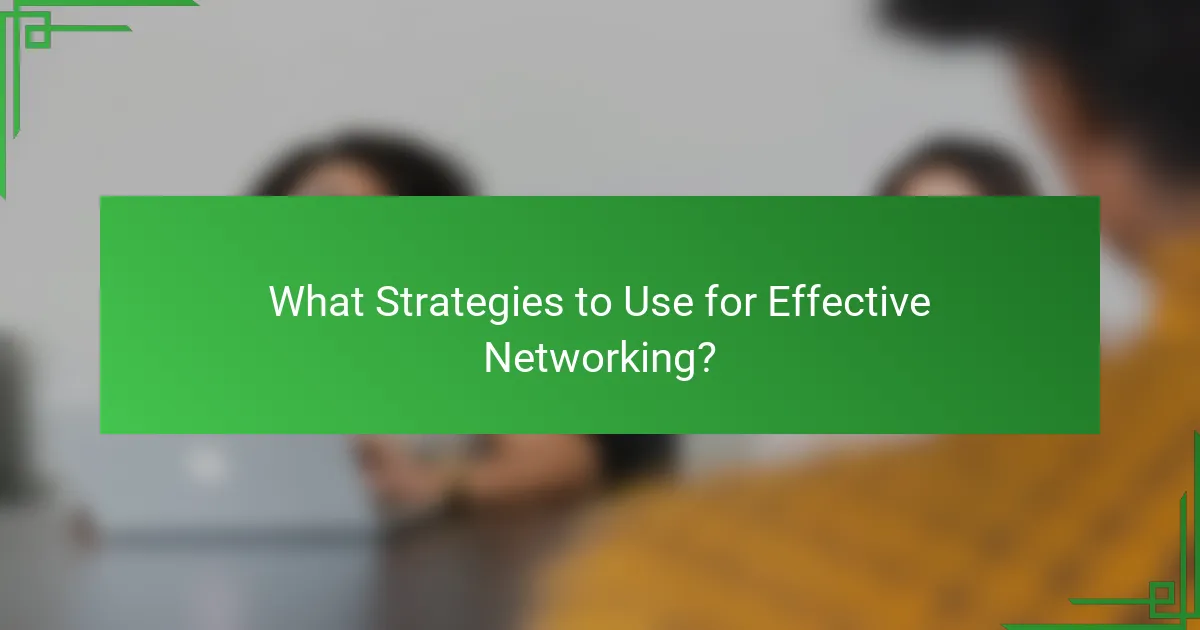
What Strategies to Use for Effective Networking?
Effective networking strategies focus on building genuine relationships and maximizing opportunities. Key approaches include preparing a compelling elevator pitch, following up after events, and utilizing social media to maintain connections.
Prepare Your Elevator Pitch
Your elevator pitch is a concise summary of who you are and what you do, typically lasting around 30 seconds. It should clearly communicate your professional background, skills, and what you seek from networking opportunities.
To create an impactful pitch, focus on clarity and relevance. Tailor your message to your audience, highlighting aspects of your experience that resonate with them. Practice delivering it confidently to ensure it feels natural during conversations.
Follow Up After Events
Following up after networking events is crucial for solidifying connections. Aim to reach out within a few days, referencing specific conversations or shared interests to jog the recipient’s memory.
Utilize email or professional networking platforms to send a brief message expressing gratitude for the interaction. Consider adding value by sharing relevant articles or resources that align with their interests, reinforcing your commitment to the relationship.
Utilize Social Media
Social media platforms, particularly LinkedIn, are powerful tools for networking. They allow you to connect with professionals, join industry groups, and share insights, enhancing your visibility and credibility.
Regularly engage with your network by commenting on posts, sharing updates, or participating in discussions. This keeps you top-of-mind and helps foster relationships over time. Be mindful of your online presence; ensure your profiles are professional and reflect your career goals.
